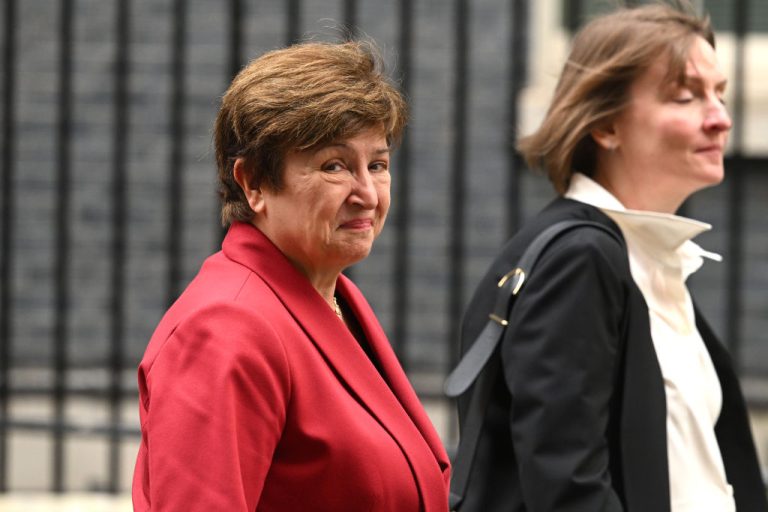The Managing Director of the International Monetary Fund told an audience at a public conference that not only is a large-scale Central Bank Digital Currency (CBDC) platform being developed, but the system will effectively merge the national currencies of member nations.
Kristalina Georgieva, Managing Director of the IMF, told a conference in Morocco, “We will pursue (CBDCs) relentlessly together,” a June 19 Bloomberg article stated.
The event appears on the IMF’s website as a “High-level Policy Roundtable on Central Bank Digital Currencies” in a page devoted to a summary of Georgieva’s speech.
Bloomberg reported only fragments of the director’s actual speech, such as a portion where Georgieva states, “We are working on a principle of interoperability.”
MORE ON BIG FINANCE AND SOCIAL CREDIT
- BlackRock ‘Recruiter’ Tells Undercover Reporter Big Finance Is Buying Politicians
- WHO Absorbs EU COVID-19 Digital Passport System as Foundation For Global Health Credential Project
- Digital ID Promoted By Major Canadian Companies In New White Paper
The outlet paraphrased this as meaning the CBDC system will need a “shared infrastructure that would avoid” what Georgieva was directly quoted as calling “settlement blocks.”
Success
You are now signed up for our newsletter
Success
Check your email to complete sign up
The director was said to have stated that settlement blocks are the “last thing we want” to avoid what Bloomberg called “further economic fragmentation.”
As described, a global CBDC system that would involve “settlement blocks” of different national currencies would work in effect at the same level as the existing SWIFT system of international fiat currency settlement.
In the existing system, a world of “economic fragmentation” has indeed emerged following the aggressive sanctions from NATO member countries and their allies against the Russian Federation over the war in Ukraine.
At present, Russia, as one of the largest producers of oil and natural gas on Earth, is known to be settling a great deal of discounted transactions with India and China in both the rupee and yuan, instead of the U.S. petrodollar.
A wire release by Reuters on the Director’s comments was much less ambiguous, quoting Georgieva as stating, “CBDCs should not be fragmented national propositions… To have more efficient and fairer transactions we need systems that connect countries: we need interoperability.”
“For this reason at the IMF, we are working on the concept of a global CBDC platform,” she added.
‘Harnessing the digital transition’
Making the “one world currency” implication of the concept more clear, Georgieva added, “If countries develop CDBCs only for domestic deployment we are underutilizing their capacity.”
Georgieva told the audience that out of 14 countries looking at implementing a CBDC, 10 central banks are “already crossing the finish line.”
Bloomberg explained, “Driven by a declining use of cash and a rising interest in crypto assets, many monetary policy institutions have been exploring the possibilities of central-bank issued digital currencies.”
The IMF summary of the director’s speech states, “Harnessing the digital transition is also a key theme of our 2023 Annual Meetings.”
A focus in the summary was on “inclusion” and strengthening “the resilience and efficiency” of the international payment system, with a specific focus on “cross-border payments and remittances” with the public benefit of them becoming “cheaper and quicker.”
This is one aspect where existing digital currencies, despite all their flaws and shortcomings, have a significant advantage over the SWIFT network: People are able to send each other a token of value that can usually be converted with ease to a fiat currency from and to anywhere in the world so long as it has even the most basic of internet access.
“In addition, CBDCs could reduce the number of intermediaries in cross-border payments, foster competition and enhance transparency,” the transcript stated, adding, “However, easy access to foreign CBDCs could lead to risks of currency substitution and capital flow volatility.”
In March, the SWIFT network itself was reportedly pushing forward with the newest stages of a trial for a CBDC blockchain system that would integrate “tokenized” stocks and bonds and even “illiquid assets” as part of a worldwide CBDC network.
The test was conducted with 18 central and commercial banks from across the world, some of the most notable of which were Canada’s Royal Bank, UBS, and the central banks of France and Singapore.
Utilizing two proprietary blockchains, Corda and Quorum, public-facing “decentralized” blockchains such as Bitcoin and Ethereum were entirely excluded from the test.
To the contrary, Quorum is actually a fork of Ethereum created by JP Morgan.















